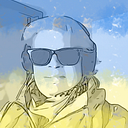Time Is Short At The End of the World: Make the Most of It with This Must-Do Activity
#51 of the 100 Story Challenge
“So, what did you do at the end of the world?”
“I carved words into marble.”
“Why?”
“I want the next ones to learn about us — that we were here. That we did beautiful and terrible things.”
“Who are the next ones?”
“Humans who survive. The next species to evolve. Alien archaeologists.”
The high pitch of the Dremel’s whine descended into a whimper and the tool froze. “Dammit!” The last battery ran out mid-letter.
I continued the conversation with myself as I plugged it into the solar panel to catch the morning rays. If there were any.
“But shouldn’t you be doing something survival-oriented? Like planting seeds or setting traps or building a water purifier?”
“There’s no point. I have plenty of canned food and bottled water for now.”
“Yes, but –”
“Struggling for survival is a waste of time. I have better things to do. Now, if you’ll excuse me…”
I waved away the imaginary interviewer and pulled off my goggles and respirator. Safety first, even now. If I went blind from a stray rock chip, I wouldn’t be able to finish my work.
I settled on the sofa with a mug of black beans and a spoon. I was getting a little tired of them, so I grabbed a can of pineapple for dessert. It would give me something to look forward to.
While I ate, I continued the interview in my mind.
“In the beginning, I engraved the alphabet. Next to the letters I drew pictures like in an abecedary. I used images from the natural world or things that I thought would still be standing 1000 years from now. Moon for m, tree for t, pyramid for p, et cetera.“
“Then, I started copying my favorite quotes. I began with “Logic will get you from A to B. Imagination will take you everywhere.” Since this is what Albert Einstein said, I added the special relativity equation E = mc2. And I decided to add the Pythagorean theorem, the hydrogen molecule, and a few other universal symbols to help with translation. At least it shows we were an intelligent species.”
The interviewer interrupted, “That’s debatable. Look at what’s happened. Humans had decades to save themselves and the planet and only a handful of them took action.”
“Don’t remind me. You can’t imagine how awful it is to live among ignorance and selfishness. I spent every day screaming into the void. It was wonderful to find a few others who cared and terrible to lose my connection with them. I hope they are okay out there somewhere.”
“But you’re not okay.”
“No, but I’m functional. This is a heavy responsibility, you know. Digital files are unreadable without working computers. Books will fall apart. Only stone has a chance of lasting.”
“Reminds me of the people who etched files onto tiles and stored them inside a mountain.”
“Yes, the mountain that was leveled by the final salvo of nukes…There’s only me now.”
The interviewer and I paused while I finished up the last bits of pineapple. Then I cleared my throat and announced, “Pardon me, I need to get back to work.”
I lit a candle and fetched my notebook from the workroom. Then I propped up a book about Buddhism and copied the quote I would engrave next.
“No one saves us but ourselves. No one can and no one may. We ourselves must walk the path.”
I’ve written other stories about climate change. I hope to have a more hopeful viewpoint one day. Maybe if enough of us work together, I will.
